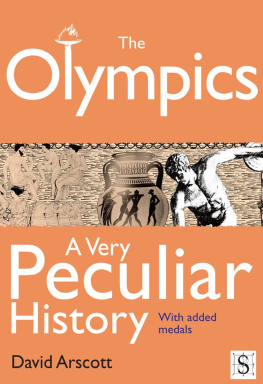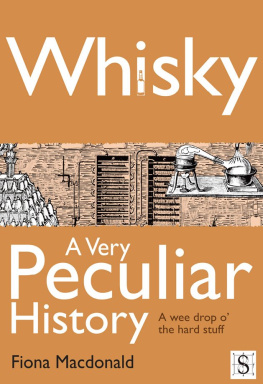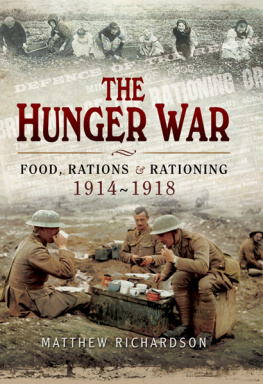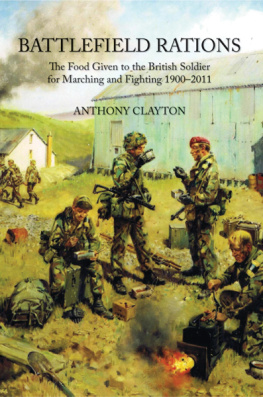Title Page
RATIONS, A VERY PECULIAR HISTORY
With NO added butter
Written by
David Arscott
Created and designed by David Salariya
Publisher Information
First published in Great Britain in MMX by Book House, an imprint of
The Salariya Book Company Ltd
25 Marlborough Place, Brighton BN1 1UB
www.salariya.com
www.book-house.co.uk
Digital edition converted and distributed in 2012 by
Andrews UK Limited
www.andrewsuk.com
Editor: Jamie Pitman
Assistant editor: Jodie Leyman
The Salariya Book Company Ltd MMX
All rights reserved. No part of this publication may be reproduced, stored in or introduced into a retrieval system or transmitted in any form, or by any means (electronic, mechanical, photocopying, recording or otherwise) without the written permission of the publisher. Any person who does any unauthorised act in relation to this publication may be liable to criminal prosecution and civil claims for damages.
Every effort has been made to trace copyright holders. The Salariya Book Company apologises for any omissions and would be pleased, in such cases, to add an acknowledgement in future editions.
Visit our website at
www.book-house.co.uk
or go to
www.salariya.com
for free electronic versions of:
You Wouldnt Want to be an Egyptian Mummy!
You Wouldnt Want to be a Roman Gladiator!
You Wouldnt Want to Join Shackletons Polar Expedition!
You Wouldnt Want to Sail on a 19th-Century Whaling Ship!
Dedication
For my grandchildren that they never go hungry
DA
Quotes

Dig for victory
Ministry of Agriculture slogan to promote the growing of food
Doctor Carrot the childrens best friend
Government wartime slogan
The ration book diet was difficult to follow and was boring and monotonous, but events have proved that it was actually good for you.
Cookery writer Marguerite Patten
Make do and mend
Government campaign to promote the recycling of clothing and other materials
When you feel tired of your old clothes, remember that by making them do you are contributing some part of an aeroplane, a gun or a tank.
The President of the Board of Trade

INTRODUCTION: Yes, we have no bananas!
For Britons, the nightly bombing raids were the very worst thing about the second world war, and stumbling about in the pitch darkness because of the blackout was a pretty grim experience, too but can you imagine the endless dreariness of standing in queues every day in the hope of buying something that had probably run out long before you reached the shop door?
There were shortages of food, of clothes, of coal to keep warm (nearly everyone had a coal fire in those days) and even of comfortable chairs to sit on if your old one wore out.
The government introduced rationing at the beginning of 1940 in order to make things as fair as possible. Without it, rich people could have bought as much as they liked, and that would have left very little for everyone else.
There were, as we shall see, crafty ways of getting round the regulations, but by and large everyone suffered together.
And if they complained, there was a common, exasperated response: Dont you know theres a war on?

Doing it by the book
Everyone had a ration book during the war beige for adults, blue for school children and pink for babies and toddlers. You had to register with a local grocer and a local butcher, and they were the only shops from which you could buy rationed food.
The coupons in the book werent a substitute for money. They simply allowed you to buy your fair share assuming that you could afford it in the first place.
The amount everyone was allowed depended on how scarce or plentiful it was at the time, which meant that the quota might vary from one month to the next.
Meat was rationed by cost rather than weight, so that you could choose between a small cut of something expensive or a joint of something cheap.
A points system covered other items, such as canned food and clothing. Everyone had the same number of points, and (as with meat) you could splurge them on something special or eke them out to buy several smaller things if you could find them!

Those queues
Its often said that the British habit of patiently and politely standing in line was learnt in wartime.
Whats certainly true (it comes up in so many memoirs) is that people would often join a queue without any idea of what they might find at the end of it. Mothers would thrust money into their childrens hands with strict instructions to bring home whatever they could afford.
And if they didnt need it? That wasnt a problem, because they could promptly sell it to someone who did probably at a small profit.
A sense of humour helped people get by. Before the war there was a popular comic song called Yes, we have no bananas, and during the war shopkeepers would display the title in their windows, as bananas were a great rarity for years.
One shop, still operating despite a gaping hole in the wall after a bombing raid, sported a tongue-in-cheek notice which read Open for business.
A royal dribble
King George VI and Queen Elizabeth set the nation a good example by living frugally at Buckingham Palace when they could have left London and lived safely on one of their country estates.
They even had a 5 inch (12.7 cm) line painted near the bottom of their bath to show how much water they should use.
No, there wasnt a shortage of water, but the government had suggested that 5 inches of water was how much a whole family should use in a week between them! in order to save the electricity used to heat it.
We dont know whether the king and queen followed this advice and shared their puddle, but when Americas First Lady, Eleanor Roosevelt, visited the palace in the autumn of 1941 (shortly before the United States entered the war) she was shocked by the spartan conditions in which they were living.
The bath water was shallow, there was no heating and she found only one electric bulb in each room.
Yes, there was indeed a war on but how had things become so very desperate?
CHAPTER ONE: Why we ran short
All countries import goods they cant make or grow themselves, but at the time war broke out Britain relied on other countries to a worrying degree. More than 50 million tons of food were being shipped in every year and that amounted to a staggering 60 per cent of everything we ate.
Being an island meant that we couldnt easily be overrun by an invading army as so many European countries were from 1939 onwards, but it also left us dangerously isolated unless we could control the seas around us.
Those waters were now patrolled by fast German E-boats carrying guns and torpedoes, while beneath the waves enemy U-boat submarines hunted our merchant vessels in deadly wolf packs which would come to the surface at night to fire their torpedoes.
Many British cargo boats were needed to transport troops and to carry munitions and other material vital to the war effort. Others did continue to bring food to our shores, but in the early months of the war they were being destroyed at a frightening rate.
Next page





